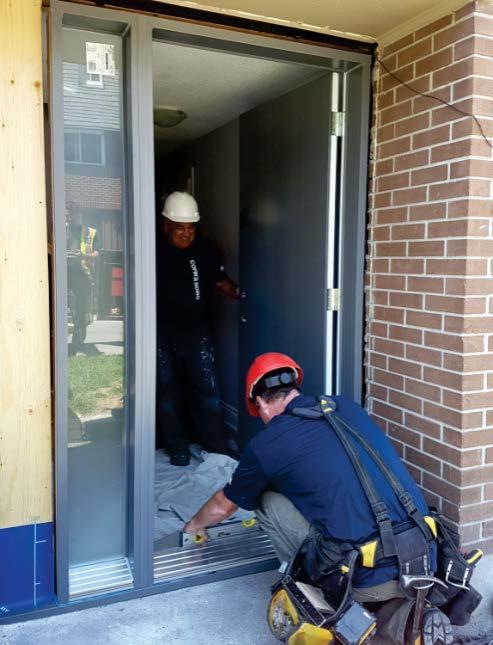
7 minute read
Virtual Meetings…Getting Past the Fear
Christy Allen Davidson Houle Allen LLP
As most in the condominium industry are aware, as a result of the Emergency Orders issued by the Province in relation to the COVID-19 pandemic and the subsequent legislation amendments, the time by which condominiums were required to hold their annual general meetings was, for many condominiums, postponed. However, now that the Declared Emergency has ended, the extensions to the timing of AGM’s under the temporary provisions in the Condominium Act, 1998 have been confirmed as follows:
Advertisement
• If the last day by which you could have held your AGM fell on a date within the emergency period (i.e. between March 17, 2020 and July 24, 2020) then it must now occur by
October 22, 2020 (i.e. within 90 days after the end of the emergency period on July 24, 2020).
• If the last day by which you could have held your AGM fell on a date within 30 days after the emergency period ended (i.e. between July 25, 2020 and August 23, 2020) then it must occur by November 21, 2020 (i.e. within 120 days after the end of the emergency period on July 24, 2020).
• If the last day by which your AGM is required to be held falls on a date after August 23, 2020 then it must still be held by the date required.
[Note: The Condominium Act requires that AGM’s be held within 6 months of a condominium’s fiscal year end. So, the above-noted timelines relate to that 6-month deadline, from your fiscal year end.]

• Any meetings that take place before November 21, 2020 (i.e. within 120 days after the end of the emergency period on July 24, 2020) can still be held electronically (even if a bylaw has not yet been passed to allow for electronic meetings), and notice can still be given electronically.
• Any meetings that are scheduled after November 21, 2020 cannot be held electronically unless a bylaw is passed to allow for this type of meeting, or the Lieutenant-Governor extends the timelines in the temporary provisions of the
Condominium Act.
Despite the timelines approaching, there are still many restrictions on gatherings. Currently, at the time of drafting this article, in-person gatherings are restricted to 50 people indoors and 100 people outdoors. There are also ongoing requirements to physically distance and to wear face masks. We’ve heard that indoor meeting space is difficult to find, and that some condominiums have been required to restrict the number of owners in attendance at in-person meetings (in order to comply with the above-noted restrictions on gatherings).
Many condominiums have elected to proceed virtually – regardless of the extension on timing for AGM’s – to avoid the risks associated with gathering owners together physically. There are some, however, that are still concerned about organizing and running virtual meetings and about the costs to hire a third party for these purposes. Now, due to the continued restrictions on gathering sizes and the upcoming deadlines, condominiums that have had reservations about virtual meetings will now seriously need to consider moving forward virtually. We are hoping to persuade these condominium boards that, while they may seem overwhelming and/or intimidating, virtual meetings are not to be feared!
In fact, virtual meetings can provide for greater owner engagement by allowing owners who might not have been able to attend a meeting in-person to participate. For others, participating from the comfort of their own homes means an easier and more relaxed AGM experience.
Virtual meetings come with a learning curve and there is no question that the various options and procedures can at first be daunting. But as with most things, experience and familiarity brings a certain level of comfort. And in our experience, the benefits of a virtual meeting are worth the time and energy associated with becoming familiar, and comfortable, with the technology.
To help alleviate some of the trepidation associated with going ahead with your first virtual meeting, we wanted to offer some of the pointers that we’ve picked up and applied so far:

1. FORUM
Pick your forum for holding your virtual meeting. Many hosting providers (including DHA) have had good success with Zoom webinars (which also allow for raised hands and polls as possible voting options during such meetings, but there are also other options for voting – see below). Zoom is also not the only option – there are some other strong meeting platforms out there. But Zoom does, at this point, appear to be the most popular.
2. RUNNING THE MEETING
We’ve found that it’s an excellent idea to have BOTH a Chair and a Host for the meeting. In many cases, this is a key to success. The Chair needs to focus on ensuring the meeting moves smoothly through the agenda. The Host will be responsible for ensuring that the technology runs smoothly, in the background.
In addition, having the Host share the screen (to show minutes, financials and other materials) allows the Chair to continue to focus on the meeting while at the same time providing attendees with access to relevant documents and presentations (screen sharing can also help to keep attendees engaged).
3. REGISTRATION
Plan out your registration process to ensure that you have a method of ensuring that you know who is in the meeting and the various voting rights of each of the participants. We like the idea of requiring owners to pre-register for the meeting and/or submit their proxies at least a day in advance of the meeting. Then, we like to prepare a chart with all owners’ names, email addresses, proxy information, and voting rights. This makes scrutinizing of close votes fairly quick and straightforward during (or after) the meeting.
4. VOTING
Determine in advance how you will handle various votes that arise during the meeting. Simple votes can often be done by show of hands. However, if there will be an election or any other vote requiring a secret ballot, we find it’s best to set those up in advance. When we Chair/Host the meeting, we’ve found that the platform “Survey Monkey”, or other such platforms, can be nicely tailored to handle secret ballots. The “survey / voting questions” can be pre-populated and then shared with

all participants, and the votes retrieved, in real time during the meeting. Again, there are other options available, including third party voting services. If the Corporation will be using a third-party provider, book early!
5. TEST RUN
Before the meeting (maybe even the night before), consider having a test run with your board and speakers to test the polls/ voting and ensure that you work out any kinks.
If you are prepared and organized, virtual meetings can run very smoothly and can be efficient and fulfilling for everyone involved. But it is important to remember that there is no “perfect” way of running a virtual meeting. Ultimately, we are all in the learning phase when it comes to virtual meetings, and it really is a matter of simply putting in your best effort as each of us learns what works best for our respective communities.
Christy Allen is one of the founding partners of Davidson Houle Allen LLP.
She provides a full range of corporate and litigation services to condominium directors, managers, owners, and insurers. She also represents co-tenancy associations and gives advice with respect to co-tenancies’ governing documents.
Christy’s work includes building deficiency actions, proceedings involving difficult owners and tenants, collection and lien proceedings, including power of sale, as well as matters involving the enforcement of property rights. She also has experience with construction law. She has appeared on behalf of her clients before the Superior Court of Justice (including the Small Claims Court), the Ontario Court of Appeal, and various administrative tribunals.
Christy is compassionate and personable. She enjoys finding solutions for people, given their circumstances, and doing so in an efficient and practical manner. She relishes the challenge of having a new problem to solve and developing creative ways to tackle it. Most rewarding of all for Christy is the opportunity to have a direct impact on her clients’ lives. n












